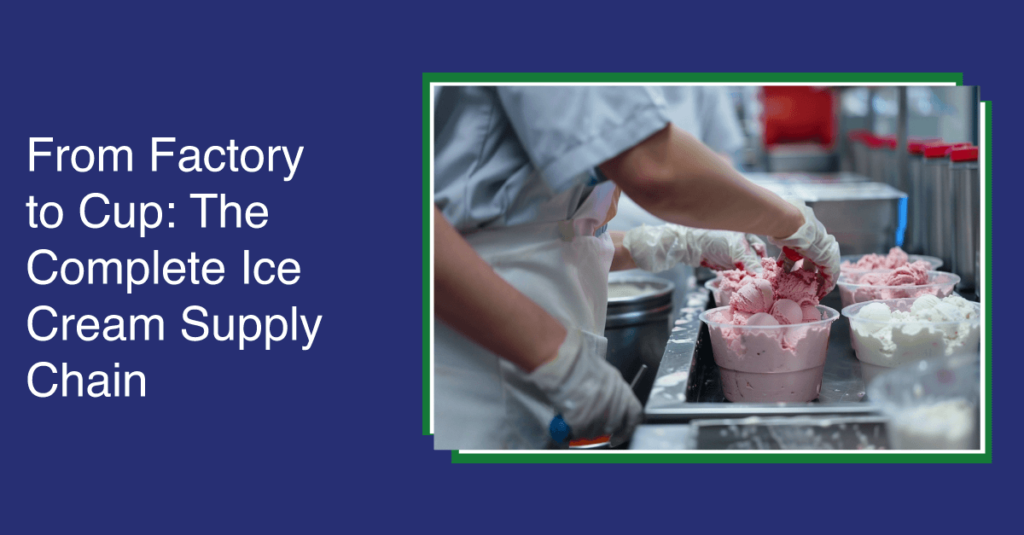Are you staring at your cup of ice cream and wondering how it was made and ended up in your freezer? The ice cream supply chain is a fascinating process that ensures every scoop you enjoy is fresh and delicious. It starts at the dairy farms, where the milk is collected and transported to factories. There, it’s mixed with other ingredients, flavoured, and frozen. After that, it’s packaged and sent to stores, waiting for you to take it home.
In this guide, we’ll walk you through each step of this journey, showing you how ice cream goes from factory to cup while maintaining its quality and taste.
A] The Journey of Ice Cream: From Production to Delivery
1. Production
The journey of ice cream begins here, and this is where magic happens. Milk and cream are combined with sugar, flavours and additives. The mixture is then pasteurised and homogenised to get a smooth consistency. Sometimes, while churning, air is used to make the texture more lightweight and create the creamy texture we all like. Once all the ingredients are combined, they are cooled down and frozen. This stage decides the foundation of the perfect scoop.
2. Packaging
Once the ice cream is made, it goes to the packaging stage. This is an important part of the process as it determines the freshness and quality of the ice cream. Proper packaging also involves labelling relevant information like nutritional facts, ingredients and storage instructions.
Ice cream is usually packed in air-tight containers to avoid being exposed to air or fluctuating temperatures; it can develop ice crystals, causing it to become gritty and unpleasant to eat. It can also change flavour and contaminate your ice cream with other odours.
3. Storage
After packaging, the ice creams are stored in ice cream warehouses. Cold storage facilities play an important role in preserving the quality and freshness of ice cream by providing a controlled storage environment before being distributed to retail. Cold storages are designed to maintain extremely low temperatures, around -18 degrees Fahrenheit, to minimise the formation of ice crystals.
Looking for B2B Last-Mile Delivery Services?
Partner with Us for Seamless B2B Last-Mile Delivery from Warehouse to Retailer
4. Transportation
Ice cream requires constant refrigeration to maintain its texture and prevent melting. Temperature-controlled trucks transport ice cream from manufacturing facilities to distribution centres, retail stores and other points of sale. Monitoring the temperature and ensuring your product remains fresh to avoid degradation is important. At JustDeliveries, we have successfully delivered ice creams using our cold chain logistics to companies like Naturals, NOTO and many more with the help of our refrigerated transportation trucks.
5. Distribution
The last step of making ice cream involves ice cream distribution. Ice cream delivery services play an important role in ensuring that the products reach retailers, supermarkets and directly to consumers. Ice cream delivery requires precision and efficiency to ensure that the ice cream is in the same condition as made. Using air-tight containers and rapid delivery methods helps maintain the temperature of storage needed for ice cream, ensuring it remains as delicious as when it left the factory.
B] Challenges In The Ice Cream Supply Chain
1. Temperature Control
One of the biggest challenges in the ice cream supply chain is temperature control. If there are inconsistencies in temperature, the ice cream’s quality can be hampered. Ice creams must be kept below -20 degrees to maintain the texture and prevent melting. This requires advanced refrigerated transportation solutions to handle such extreme conditions. Even minor deviations in temperature can lead to melting, followed by refreezing, which can affect its molecular structure, resulting in a less smooth texture and diminished flavour quality.
2. Efficient Transportation and Logistics
Proper transportation of the ice cream ensures product quality. Ice cream has special requirements for refrigerated transportation to maintain the correct storage temperature. Ice cream delivery services must design proper techniques of handling and timely deliveries with adequate equipment to avoid melting and, hence, spoilage during transit.
3. Inventory Management
Inventory management in the ice cream business is more than just counting stock. Monitoring stock levels closely, rotating the flavours, and predicting customer needs and seasonal changes are important for effective inventory management. Efficient ice cream delivery services like JustDeliveries precisely coordinate to keep the stock fresh and readily available without overstocking or understocking.
4. Quality Assurance and Safety
Random checks have to be carried out to determine whether, for that health standard, the ice cream remains eatable. Other than that, seasonal demands are a challenge. During peak summer, the demand for ice cream surges, putting extra pressure on logistics to maintain quality while meeting the increased volume of requirements. With the help of the right cold chain logistics, you can ensure that every tub of ice cream arrives in perfect, scoop-ready condition.
5. Cost Management
Cost management is one of the important areas in the ice cream supply chain. From production to delivery of the ice cream, you can control expenses by optimising ice cream delivery services, managing labour costs, and reducing costs while maintaining quality. Doing so can ensure that your treats remain affordable without compromising on taste.
C] Innovation And Future Trends
1. Advanced Refrigeration Technologies
Maintaining the ideal storage temperature during transit is important to preserve quality. New advanced technologies are changing the ice cream transportation game and ensuring that ice cream is at an optimum temperature throughout the journey from the factory to the ice cream warehouse and finally to the store. This allows every scoop to be fresh and delicious as intended.
2. IoT and Real-Time Monitoring
Since one of the main concerns is temperature control, recent technological advancements like real-time monitoring help track temperature data, identify trends, and make informed decisions to optimise logistics processes and reduce quality risks. In addition to continuous improvement efforts, this data can help identify opportunities to reduce food waste and increase overall efficiency. By closely monitoring and analysing data, expiration dates, and much more, companies can use strategies to minimise product spoilage and waste.
3. Sustainable Packaging Solutions
With growing environmental concerns, sustainable packaging solutions are becoming a priority for businesses. Companies have actively shifted towards using biodegradable and recyclable materials to reduce waste without losing the product’s integrity. The new eco-friendly and biodegradable packaging materials deliver your ice cream in perfect condition, complemented by eco-friendly surroundings.
4. Automation and Robotics
Robotics and automation are the game-changers in the field of ice cream distribution. Ice cream warehouses today have robots for tasks like sorting, picking, and even transporting ice cream. It reduces inefficiencies, cost-effective labour, and decreases human error. The whole ice cream delivery process is now faster and conducted with precision due to automation, which guarantees timely and accurate deliveries.
Need Reliable Ice Cream Logistics for Your Business?
Connect with us for efficient and secure B2B ice cream transportation solutions.
Conclusion
We have discussed how the ice cream supply chain works, the challenges, and the new technology to streamline the process. If you are looking for a cold chain logistics company, JustDeliveries offers cold chain supply to keep your perishables fresh and provide timely delivery. Our refrigerated trucks ensure your products are uncontaminated and your consumers receive the best quality products. Contact us to know more!

Mansi Mahansaria
I’m Mansi Mahansaria, CEO and Founder of JustDeliveries, a B2B logistics company specializing in the food and beverage sector. With a background in Chemical Technology (ICT Mumbai), an MBA (FMS Delhi), and experience at IDFC Private Equity and Tata Group, I’ve built a plug-and-play logistics network helping F&B brands scale efficiently. I also share insights on entrepreneurship and logistics at industry and academic events.






